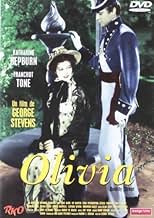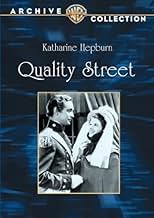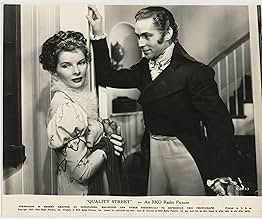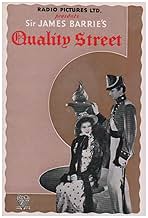IMDb RATING
6.2/10
1.4K
YOUR RATING
In the 1810s, an old maid poses as her own niece in order to teach her onetime beau a lesson.In the 1810s, an old maid poses as her own niece in order to teach her onetime beau a lesson.In the 1810s, an old maid poses as her own niece in order to teach her onetime beau a lesson.
- Nominated for 1 Oscar
- 3 wins & 1 nomination total
Sherwood Bailey
- William Smith
- (uncredited)
William Bakewell
- Lt. Spicer
- (uncredited)
Joan Fontaine
- Charlotte Parratt
- (uncredited)
Helena Grant
- Fanny Willoughby
- (uncredited)
Bonita Granville
- Isabella
- (uncredited)
Carmencita Johnson
- Student
- (uncredited)
Payne B. Johnson
- School Boy
- (uncredited)
Darwood Kaye
- Student
- (uncredited)
Florence Lake
- Henrietta Turnbull
- (uncredited)
Helen Lynn
- Girl
- (uncredited)
Lydia McKim
- Schoolgirl
- (uncredited)
Clifford Severn
- Arthur, a Student
- (uncredited)
Featured reviews
QUALITY STREET (RKO Radio, 1937) directed by George Stevens, stars Katharine Hepburn in her third costume movie in a row (following 1936 releases of "Mary of Scotland and "A Woman Rebels"), and her first to be classified a comedy. Taken from the old stage play by Sir James M. Barrie, the same author whose work was used for Hepburn's 1934 release of THE LITTLE MINISTER, places the now legendary actress for the first of many times in the role of a spinster, but in this case not entirely throughout its 84 minutes.
The setting: "1805 England. Quality Street where a gentleman passerby is an event." Other than an event, Quality Street is also a location of homes where spinster women peep through their window curtains watching everything that goes on. The story introduces Susan Throssel (Fay Bainter), an old maid, hosting her spinster guests, sisters Mary (Estelle Winwood) and Fanny Willoughby (Helena Grant), and Henrietta Turnball (Florence Lake) as they crochet while one reads a book aloud. Phoebe (Katharine Hepburn), Susan's younger sister, arrives with the news of having met a certain individual dashing young man who's finds her fascinating, and will soon be arriving to tell her some important news. Thinking the young man to be interested in proposing marriage to Phoebe, Susan, once engaged to William, a Naval officer, offers her sister a wedding gown she never used. When Doctor Valentine Brown (Franchot Tone) comes to call, he surprises Phoebe with the news about enlisting in the Napoleonic war, stirring up bitter disappointment for her, especially after watching him marching off with the other enlistments. Ten years later, Phoebe and Susan, now spinster teachers at "The Misses Throssel School for Boys and Girls," find the soldiers returning home from war. Upon his arrival, Valentine becomes disappointed to find the once vibrant and beautiful Phoebe, now 30, looking old and tired. Noticing how the other ensigns (William Bakewell and Roland Varno) are wooing the young and silly Charlotte Parratt (Joan Fontaine), Phoebe abandons her drab existence by applying herself with new clothes and hair style. Phoebe's youthful appearance immediately attracts Valentine attention, who fails to recognize her as the girl he once loved. Passing herself off as her visiting flirtatious niece, Olivia, Phoebe not only becomes in Valentine's eyes, but after escorting her to the ball, attracts the attention of Charlotte's suitors as well. Problems arrive as the snoopy Henrietta and the Willoughby sisters suspect both Phoebe and "Livvy" to be one of the same, forcing Phoebe to wonder how long she'll be able to go on with her masquerade without arousing Valentine's suspicion and possibly losing him in the process.
Though the masquerading idea of woman attempting to fool the man she loves by becoming another identity is nothing new, it always seems to go well, especially wondering what will result for its climax. In spite the fact that QUALITY STREET was used as a basis of a silent 1927 MGM comedy starring Marion Davies, Conrad Nagel and Helen Jerome Eddy in the Hepburn, Tone and Bainter roles, the 1937 remake reportedly didn't do as well as the Davies original possibly due to Hepburn's current theatrical failures that labeled her at the time as "box-office poison." Even though QUALITY STREET somewhat resembles Jane Austen's PRIDE AND PREJUDICE (successfully filmed by MGM in 1940) by way of locale, costume setting and spinster characters of the 19th century, the film itself is quite quaint and lavish scale with fine underscoring credited to Roy Webb. Of the supporting players, there's the comic relief of Eric Blore as a recruiting sergeant with a constant blink of an eye towards Patty (Cora Witherspoon); Fay Bainter providing character interest as both sympathetic spinster and mousy schoolteacher afraid of one of her students, a tall bully by the name of William Smith (Sherwood Bailey). It's also interesting spotting Estelle Winwood, a familiar face in many TV shows of the 1960s and 70s very early in her career, along with future Academy Award winner, Joan Fontaine, in two brief scenes, one with Hepburn.
Regardless of its reputation that caused QUALITY STREET to be seldom revived on commercial television back in the 1960s and 70s, the film itself began to surface more frequently later on with revivals on public television, home video (1980s-90s) and later DVD, cable television (American Movie Classics prior to 1998) and Turner Classic Movies. Alternative versions have usually been found through its opening credits: Title card Movietime" used in place of RKO Radio logo commonly shown in sixties and seventies; a brief glimpse insertion from an early RKO title, LET'S TRY AGAIN (1934) before the actual QUALITY STREET title fills the screen, or the restored theatrical opening on TCM. For anyone unfamiliar with both Hepburn and QUALITY STREET, it's worth seeing through once, at least out of curiosity (***)
The setting: "1805 England. Quality Street where a gentleman passerby is an event." Other than an event, Quality Street is also a location of homes where spinster women peep through their window curtains watching everything that goes on. The story introduces Susan Throssel (Fay Bainter), an old maid, hosting her spinster guests, sisters Mary (Estelle Winwood) and Fanny Willoughby (Helena Grant), and Henrietta Turnball (Florence Lake) as they crochet while one reads a book aloud. Phoebe (Katharine Hepburn), Susan's younger sister, arrives with the news of having met a certain individual dashing young man who's finds her fascinating, and will soon be arriving to tell her some important news. Thinking the young man to be interested in proposing marriage to Phoebe, Susan, once engaged to William, a Naval officer, offers her sister a wedding gown she never used. When Doctor Valentine Brown (Franchot Tone) comes to call, he surprises Phoebe with the news about enlisting in the Napoleonic war, stirring up bitter disappointment for her, especially after watching him marching off with the other enlistments. Ten years later, Phoebe and Susan, now spinster teachers at "The Misses Throssel School for Boys and Girls," find the soldiers returning home from war. Upon his arrival, Valentine becomes disappointed to find the once vibrant and beautiful Phoebe, now 30, looking old and tired. Noticing how the other ensigns (William Bakewell and Roland Varno) are wooing the young and silly Charlotte Parratt (Joan Fontaine), Phoebe abandons her drab existence by applying herself with new clothes and hair style. Phoebe's youthful appearance immediately attracts Valentine attention, who fails to recognize her as the girl he once loved. Passing herself off as her visiting flirtatious niece, Olivia, Phoebe not only becomes in Valentine's eyes, but after escorting her to the ball, attracts the attention of Charlotte's suitors as well. Problems arrive as the snoopy Henrietta and the Willoughby sisters suspect both Phoebe and "Livvy" to be one of the same, forcing Phoebe to wonder how long she'll be able to go on with her masquerade without arousing Valentine's suspicion and possibly losing him in the process.
Though the masquerading idea of woman attempting to fool the man she loves by becoming another identity is nothing new, it always seems to go well, especially wondering what will result for its climax. In spite the fact that QUALITY STREET was used as a basis of a silent 1927 MGM comedy starring Marion Davies, Conrad Nagel and Helen Jerome Eddy in the Hepburn, Tone and Bainter roles, the 1937 remake reportedly didn't do as well as the Davies original possibly due to Hepburn's current theatrical failures that labeled her at the time as "box-office poison." Even though QUALITY STREET somewhat resembles Jane Austen's PRIDE AND PREJUDICE (successfully filmed by MGM in 1940) by way of locale, costume setting and spinster characters of the 19th century, the film itself is quite quaint and lavish scale with fine underscoring credited to Roy Webb. Of the supporting players, there's the comic relief of Eric Blore as a recruiting sergeant with a constant blink of an eye towards Patty (Cora Witherspoon); Fay Bainter providing character interest as both sympathetic spinster and mousy schoolteacher afraid of one of her students, a tall bully by the name of William Smith (Sherwood Bailey). It's also interesting spotting Estelle Winwood, a familiar face in many TV shows of the 1960s and 70s very early in her career, along with future Academy Award winner, Joan Fontaine, in two brief scenes, one with Hepburn.
Regardless of its reputation that caused QUALITY STREET to be seldom revived on commercial television back in the 1960s and 70s, the film itself began to surface more frequently later on with revivals on public television, home video (1980s-90s) and later DVD, cable television (American Movie Classics prior to 1998) and Turner Classic Movies. Alternative versions have usually been found through its opening credits: Title card Movietime" used in place of RKO Radio logo commonly shown in sixties and seventies; a brief glimpse insertion from an early RKO title, LET'S TRY AGAIN (1934) before the actual QUALITY STREET title fills the screen, or the restored theatrical opening on TCM. For anyone unfamiliar with both Hepburn and QUALITY STREET, it's worth seeing through once, at least out of curiosity (***)
Delightful comedy of errors. Pheobe (Hepburn) is in love with the dashing Dr. Brown, but alas her love is unrequited. They meet again 10 years later on his return from the Napoleonic Wars. She has wilted under the strain of teaching little children and is self-conscious about her age. On a whim she decides to dress in her former radiant style, and ends up being mistaken by Dr. Brown for Pheobe's niece. They start to court, and from there it's all silly and predictable, but... sparkling dialogue, great acting and wonderful supporting parts (especially the nosy old spinsters at the windows)
This is a gem!--IF you like stories set in this time period to begin with. IF you like the more sentimental acting style prevalent in the 1930's. And probably IF you're female.
This has some resonance with Jane Austen's Persuasion. For me, it felt as if I'd found a new Georgette Heyer story, and on film! This is set in the Regency period in England. It is both romantic and comedic.
Katherine Hepburn gives another great performance, similar to her Jo March in Little Women. I don't find her acting over the top at all. Franchot Tone is a good foil for her--not a great actor, but pretty hunky. Additionally, it has a lovely cast full of the kind of character actors you see in films like the Greer Garson Pride and Prejudice. In this case, it's Fay Bainter, Estelle Winwood, and other notables giving the film a fey charm.
This has some resonance with Jane Austen's Persuasion. For me, it felt as if I'd found a new Georgette Heyer story, and on film! This is set in the Regency period in England. It is both romantic and comedic.
Katherine Hepburn gives another great performance, similar to her Jo March in Little Women. I don't find her acting over the top at all. Franchot Tone is a good foil for her--not a great actor, but pretty hunky. Additionally, it has a lovely cast full of the kind of character actors you see in films like the Greer Garson Pride and Prejudice. In this case, it's Fay Bainter, Estelle Winwood, and other notables giving the film a fey charm.
Quality Street is a contrived romance, with a small cast, on a set that looks like a play stage, with few visual impacts and in B&W. So, why did we enjoy it so much? The cast, down to the overplayed smaller parts, all does a great job. The ensemble cast brings spirit to even the small parts, the dialogue is clever, and the asides and glances make it fun. We particularly enjoyed the set and period behaviors as great insights on life in the early 19th century. Hollywood did a great job in establishing this period essence through effective use of hints and props. If you like Hepburn, you will enjoy this moral story, with feminine strength in an unforgiving society. Worth a relook!
For her second time in a James M. Barrie role, Katharine Hepburn starred in a remake of Quality Street. Hepburn had previously played a little Scot's minx in The Little Minister also for RKO.
Barrie did right by her again, she was well cast as one of the Throssel sisters of Great Britain of the Napoleonic Era. She and sister Fay Bainter look like they're doomed to be spinsters. Bainter has resigned herself to that fate, but Hepburn still has hopes.
But when she thinks Franchot Tone might be popping the question, he's only around to tell her he's doing what Admiral Nelson expects of every man, his duty to England. In 1805 he enlists in the army and Hepburn and Bainter go on teaching school.
Ten years go by and when Tone doesn't at first recognize Hepburn when he returns, she thinks her prime has passed. But she'll teach Tone a lesson by impersonating her own made up niece. And what a niece, a naughty flirt who entrances all the young blades returned from the wars and doing a job on Tone's ego as well.
Quality Street has a quality history, it was first performed on Broadway by the immortal Maude Adams in 1901 and then made a silent film in 1927 starring Marion Davies and Conrad Nagel. I can certainly see why William Randolph Hearst thought this a good role for Davies. She could be both a crinolined heroine and also use her comic talents as well. Hepburn also gets to use her full talents playing one role straight and imitating a fictitious person at the same time.
Quality Street got an Oscar nomination for Best Musical Score. If it sounds familiar the theme was recycled later on for the frontier film Rachel And The Stranger. It was even given words that were sung on record by that film's star Robert Mitchum.
And George Stevens after doing Alice Adams with Hepburn was assigned this one as well. He'd do even better the third and last time he worked with Hepburn in Woman Of The Year.
Quality Street is a good film, but I'm sure that Depression Era audiences found a Victorian Era comedy a bit dated.
Barrie did right by her again, she was well cast as one of the Throssel sisters of Great Britain of the Napoleonic Era. She and sister Fay Bainter look like they're doomed to be spinsters. Bainter has resigned herself to that fate, but Hepburn still has hopes.
But when she thinks Franchot Tone might be popping the question, he's only around to tell her he's doing what Admiral Nelson expects of every man, his duty to England. In 1805 he enlists in the army and Hepburn and Bainter go on teaching school.
Ten years go by and when Tone doesn't at first recognize Hepburn when he returns, she thinks her prime has passed. But she'll teach Tone a lesson by impersonating her own made up niece. And what a niece, a naughty flirt who entrances all the young blades returned from the wars and doing a job on Tone's ego as well.
Quality Street has a quality history, it was first performed on Broadway by the immortal Maude Adams in 1901 and then made a silent film in 1927 starring Marion Davies and Conrad Nagel. I can certainly see why William Randolph Hearst thought this a good role for Davies. She could be both a crinolined heroine and also use her comic talents as well. Hepburn also gets to use her full talents playing one role straight and imitating a fictitious person at the same time.
Quality Street got an Oscar nomination for Best Musical Score. If it sounds familiar the theme was recycled later on for the frontier film Rachel And The Stranger. It was even given words that were sung on record by that film's star Robert Mitchum.
And George Stevens after doing Alice Adams with Hepburn was assigned this one as well. He'd do even better the third and last time he worked with Hepburn in Woman Of The Year.
Quality Street is a good film, but I'm sure that Depression Era audiences found a Victorian Era comedy a bit dated.
Did you know
- TriviaThe Nestle produced chocolates "Quality Street" were named after J. M Barrie's play by their original manufacturer Mackintosh in 1936.
- GoofsWhen Phoebe and Susan are talking about Mr. B., Phoebe is on a chair and Susan is sitting on a sofa a certain distance near a bonnet. But on the following cuts, Susan's sitting position keeps changing so that she is gets closer and closer to the bonnet.
- Quotes
Mary Willoughby: [Goes to the window and looks out] It's that impertinent recruiting sergeant. I passed him on the street yesterday. He closed one of his eyes at me, then quickly opened it again.
[She demonstrates to the other ladies in the room]
Mary Willoughby: I knew what he meant.
[She looks out again and sees the recruiting officer wink at her. She quickly closes the window curtain]
- Crazy creditsOpening card:
1805 England Quality Street Where a gentleman passerby is an event.
- ConnectionsFeatured in George Stevens: A Filmmaker's Journey (1984)
- How long is Quality Street?Powered by Alexa
Details
- Runtime
- 1h 23m(83 min)
- Color
- Aspect ratio
- 1.37 : 1
Contribute to this page
Suggest an edit or add missing content




































